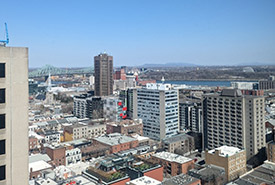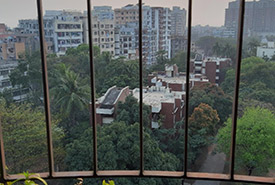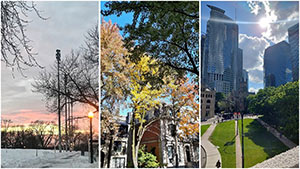Reminiscing about nature in Dhaka

Montreal in April (Photo by Syeda Zareen Rafa/NCC staff)
I arrived in Montreal from Dhaka, Bangladesh, in August 2019, equal parts excited and nervous to start a new chapter of my life in a completely new city. It has been a while since then, and Montreal has seen me through my undergrad at McGill University (half of which was spent amidst a global pandemic) and the start of my career at the Nature Conservancy of Canada (NCC). Montreal has been a wonderful place to live, with the warmest people, the cutest cafés and marvelous natural beauty.
My parents finally got to experience some of this too, as they visited me here for the first time this past April. They flew in all the way from Dhaka, which is no small feat; the journey includes 18 hours in the air. As exhausting as the flight might have been, I was elated they made it. And what’s more, they arrived at an excellent time — when sunshine finally returned to the city, and the temperature was just right, like Baby Bear’s porridge!
The only hiccup was that spring hadn’t waved the magic wand that turns everything green just yet. The grass was patchy, and the trees were bare. As a not-so-proud member of the social media generation, I was mildly disheartened that the pictures I’d been clicking throughout this trip lacked that captivating green pop of colour. Case in point: this view of Montreal from my parents’ 26th-floor hotel room (as seen at top of the blog). It’s beautiful, of course, but it would have been breathtaking with some green in the mix.

Dhaka in February (Photo by Syeda Zareen Rafa/NCC staff)
In moments like this, I miss Dhaka’s warm, humid climate with its abundance of rain and sunshine, which make greenery a year-round affair. The picture above, for example, was taken in February — one of the colder months in Bangladesh — but there is no shortage of lush greenery.
For the sake of complete honesty, however, I should clarify, Dhaka does not look this green all over. It’s a bustling, densely populated metropolis and, in many parts of the city, the grey and beige from the concrete overshadow any speck of green. I remember feeling frustrated as a child at the lack of parks or fields near my house where I could play. But in a city of over 20 million people, housing, understandably, takes priority over natural open spaces.

My parents’ cat, Bruce, destroying their plants (Photo by Syeda Zareen Rafa/NCC staff)
Humans are resilient, though. Amidst the rapid disappearance of natural spaces in the city, many people fill their balconies with plants. And generally speaking, the abundance of sunlight throughout the year means that the plants don’t require too much upkeep (unless you have a creature in your house intent on destroying them, like Bruce here).
Dhaka may not be the best place to experience nature in Bangladesh, but the country is home to natural wonders like Cox’s Bazar, the world’s longest natural sea beach, and the Sundarbans, a 140,000-hectare mangrove forest and UNESCO World Heritage Site. The latter is one of the few places in the world where the endangered royal bengal tiger can still be seen in its natural habitat.
Of course, that just paints a rosy picture. By virtue of being close to the Himalayas and having low-lying lands, Bangladesh is exposed to extreme levels of flooding as icecaps melt and sea levels rise. The effects of climate change are felt intimately here — this April, the temperature in Dhaka rose to 40.4 C, breaking a 58-year record.

Winter, fall and summer in Montreal (Photo by Syeda Zareen Rafa/NCC staff)
In the interest of not steering this blog toward a completely depressing direction, I’ll transition back to my original point, which was that trees are green in Dhaka throughout the year. But as nice as the year-long presence of sunlight is, I find that the lack of sunshine in Montreal in the winter months makes me appreciate spring and summer in a way I never did before. Plus, the transition from one colour palette to the next as the seasons change is a spectacular thing to witness.
It isn’t lost on me how fortunate I’ve been, getting to experience nature in such drastically different settings. It allows me to recognize the importance of protecting biodiversity globally and makes me genuinely proud to be working at a place like NCC. Oh, and finally, having access to both cities means I get to cheat the weather a little, by staying in Montreal during the summer when the heat in Dhaka is extreme and flying to Dhaka to avoid Montreal’s harsh winters.


